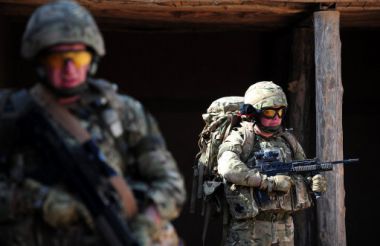'The role of religion in conflict is exaggerated,' says Blair's chief of staff

Wednesday saw academics at the last of this year's Westminster Faith Debates discuss the role of religion in peace building and its capacity to reduce conflict rather than propel it.
Chaired by former home secretary and Labour MP Charles Clarke and Professor Linda Woodhead of Lancaster University, the evening brought a lively discussion and fascinating debate, as the panellists thrashed out their views in front of a live audience. There was clear dissent among those present, which made for an interesting and productive dialogue.
Professor John Brewer, an expert in peace building from Queens University in Belfast, opened up the debate with the assertion that researchers and practitioners often place too much significance on the role of religion in conflict, rather than in peace.
He broke down the meaning of 'peace' in itself to two separate entities - "state building", that is, the political peace process involving the reintroduction of governance structures, and "nation building", the social peace process by which those formerly engaged in conflict learn to live alongside one another.
"There is potential for religious NGOs and faith-based actors to play a role in both of these kinds of peace building," Brewer asserted.
"But the primary role is in the social peace process, dealing with the legacy of the conflict: forgiveness, hope, memory and the meaning of justice.
"One has to overcome the naivety of peace building literature and address the weaknesses as much as the strengths; the opportunities as much as the threats," he concluded.
Later on in the debate, Tony Blair's former Chief of Staff Jonathan Powell agreed with Brewer, suggesting "it is possible that the role of religion in causing conflict is exaggerated".
He indicated that 'religious' wars are often not about faith at all, but rather politics, tradition, power and equality.
"It's not about issues of religion, but about identity and economics," he said.
"Religion can play an important role in peace building, and creating a context for peace making. It is not the role of religion to mediate, but interfaith dialogue can produce a context in which to isolate extremism and bring about peace."
Professor Ian Reader then took the floor, however, offering a more negative perception of the role of religion in the peace building process. He was quick to underline his belief that religion is "problematic in terms of the context of the political sphere".
"Peace comes out of the political sphere much more than the religious," he contended, citing US student protests about the war in Vietnam as an example of this. "When the world of politics listens we have the capacity for peace building," he declared.
Reader suggested that peace building was associated with "weaker" aspects of religion, and therefore it is "highly problematic" to combine the two. "We have to locate peace in the political sphere," he declared.
"The question is: how do political spheres negotiate around religion?"
Sociologist Keith Kahn-Harris was also sceptical of the role of religion in negotiating peace, and noted that it is "striking how advocates for peace in one religious context can search to create conflict in another".
He went on to highlight the danger of using the resolution of one conflict as a direct "template" for another, asserting that each conflict is different, and requires a unique approach.
Following those introductory remarks, questions were then taken from the audience. Topics such as the importance of mediation and reconciliation, the Church's role in the implementation of peace agreements and engagement with sectarianism were all raised.
Despite his keenness to suggest that religion can play a vital role in peace processes, Brewer responded to these thoughts by highlighting the potential weaknesses a religious approach can offer with regards to peace making.
"It is often disconnected from other parts of society," he noted.
Kahn-Harris expressed his agreement, noting that "global inter-faith dialogue is often problematic in that it is elevated. It can set the context for what's on the ground, but it's often disconnected".
He added that by focussing too much on the "transcendent", religion fails to engage with the practical and pragmatic aspects of peace building, thus exposing the approach as somewhat flawed.
There was no clear agreement among the panellists by the conclusion of the debate as to the extent to which religious NGOs and faith groups are able to facilitate and mediate peace processes, though it was suggested that they are at least able to offer and establish room for healthy discussion.
In his summarisation, however, Clarke did make a statement with which all four of the panellists seemed to agree. "We need to disentangle the role of religion in the origin of conflict", Clarke urged.
Not doing so, he argued, serves to "populate ignorance" and merely undermine attempts to bring unity and reconciliation in fractured nations across the globe.











